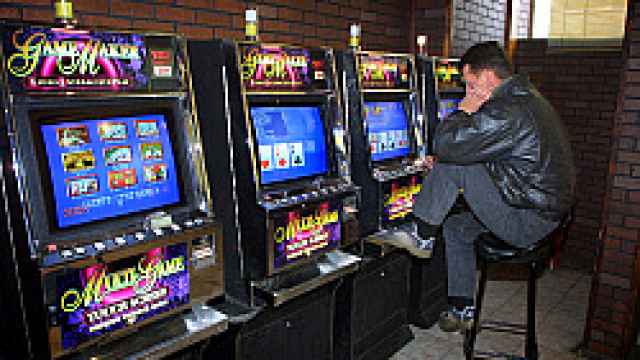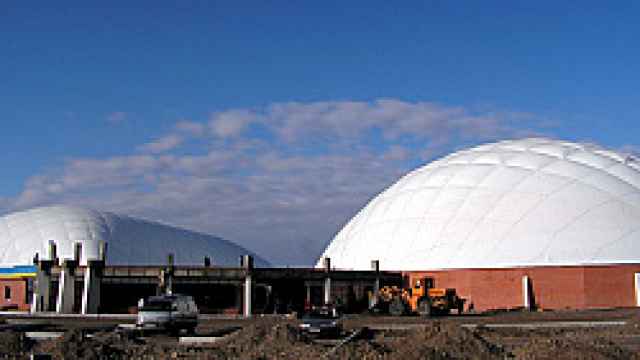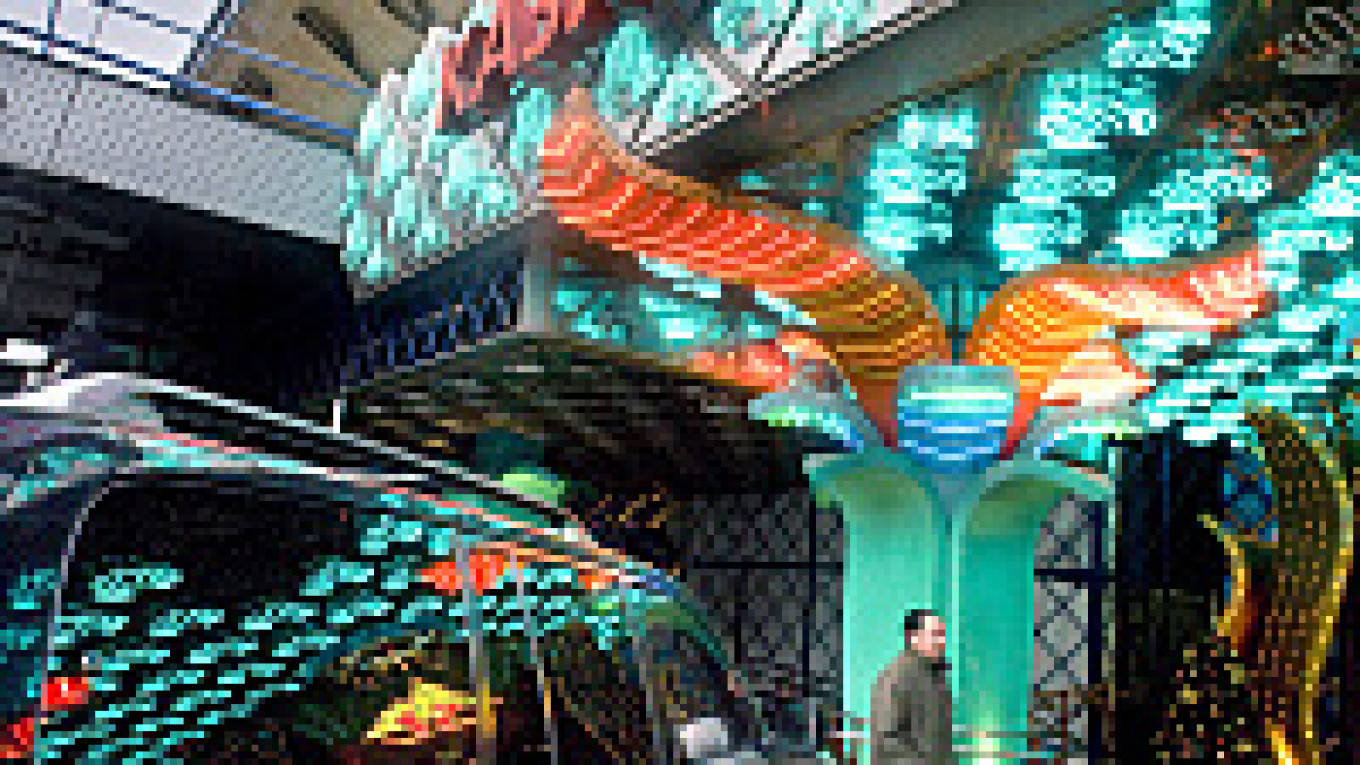Some of the sector's top companies say that enforcing a ban on betting, set to take effect in all but the four zones from July 1, 2009, would put thousands of people out of work in one of the few industries largely untouched by the recent economic downturn.
A 2006 law — which some say may yet be changed ?€” allows for legal gambling in four special zones: Kaliningrad, Siberia's Altai region, the Far East and on the southern Sea of Azov. Three of these zones have proven to be non-starters because areas within the regions have not been defined, they are too remote or infrastructure is underdeveloped. By most accounts, the best-situated zone is straddling the Rostov and Krasnodar regions on the Sea of Azov.
But even there, international investors who initially signaled interest in building at Azov-City, as the zone is to be known, are getting cold feet.
"As far as I know, there are hardly even streets to go there," said Martin Himmelbauer, a spokesman for Casinos Austria, which has 79 casinos in 18 countries. "How is it to be finished by July of next year?"
In April, representatives of the Vienna-based casinos owner met with Rostov Governor Vladimir Chub to discuss Azov-City, which they called an "excellent idea," Interfax reported at the time.
Regional government officials overseeing the development of the zone said they had relaxed rules so that investors must only start their construction by next summer ?€” not complete it. Nonetheless, Casinos Austria has decided that it will hold off for now.
Himmelbauer, whose company signed an initial letter of interest in May, said Casinos Austria would still be interested in developing a site in Azov-City, although it may take other companies to pave the way, particularly in this economic climate.
"We're not the ones to push it," he said.

Vladimir Filonov / MT
A man at a slot hall in Moscow. In 2007, the city closed all slot machine halls smaller than 100 square meters.
| |
A site in the Far East has not yet even been identified, she and other gambling industry professionals said. Local political scuffles have held up development in Kaliningrad, and Altai ?€” some 3,000 kilometers from Moscow in southern Siberia ?€” is simply too far away.
"The only thing you can do there is fish," she said. "It's cheaper, easier and more relaxing for Russians to go to Egypt in the winter than to a casino in Altai," she added.
Stephane Meyrat, a vice president at Jones Lang LaSalle Hotels, agreed that Altai was too isolated to attract major developers. He said Kaliningrad could be appealing, although it too lacks some infrastructure because it is only a one-hour flight from Moscow. Vladivostok, capital of the far eastern Primorye region, could draw Chinese tourists from cities including Harbin, he added.
The Russian gambling industry brings in $8 billion per year, according to the Russian Union of Industrialists and Entrepreneurs, and employs some 500,000 people. Opponents of the zones say that forcing a move prematurely ?€” particularly during a financial crisis ?€” would cause major hardship for the companies and their workers.
The first contraction came in the summer of 2007, when slot halls smaller than 100 square meters were banned. Many ultimately switched gears to become flower shops.
In Moscow, the industry is dominated by the Ritzio Entertainment Group and Storm International. Ritzio owns 400 gambling outlets in Russia, under names including Vulcan and X-Time. Storm, which owns the Shangri La casino on Pushkin Square with a movie-theater partner, said it paid 881 million rubles ($32.2 milllion) in taxes last year.
Both have said they have no interest in moving to the four regions when the law takes effect, instead focusing on an expansion abroad. Ritzio has also opened dozens of grocery stores under the brand Smak with food retailer Dixy.
"We will just shut down our casinos here, that's it," said Lavrenty Gubin, Storm's spokesman. "Most of our 6,000 employees here will lose their jobs."
Gubin suggested that alternative zones closer to Moscow might still be named. If the government does go through with its plan to outlaw gambling in Moscow, illegal and nontaxable gambling would proliferate, he said.

For MT
A inflatable-domed sport center built by Asati in the Tyva republic in 2007.
| |
The industry has already seen a glimmer of hope for a legislative reversal. In the summer, State Duma Deputy Alexander Popov, from the ruling United Russia party, introduced a bill that would have pushed back the proposed change by three years. But the initiative apparently found little support and was quickly retracted.
Despite the uncertainty over whether the government will go through with the relocation on schedule, the development on the Sea of Azov is underway.
Companies with different levels of gambling experience are hoping that tourists will flock to the sea ?€” currently far less popular than the nearby Black Sea. Some are also betting that the local administrations will complete the monumental task of bringing electricity, gas, water and roads to the site.
Rostov officials said the region would invest about 3 billion rubles ($110 million) in new infrastructure on its side, which would eventually include an 85-kilometer water conduit and a new power substation. Krasnodar region officials did not respond to requests for comment for this article.
Lyubov Solodovnik, press secretary of the Rostov region's economic ministry, said basic utilities would be brought to the site by the end of November and a road there would be rebuilt in the spring.
Korston Group, which operates several hotels and casinos in Russia, says it is planning to make the trip about 1,000 kilometers south this summer. The company is in talks with Asati, the Russian unit of Air Structures American Technologies, a specialist builder of inflatable, domed structures.
Construction of their complex for Azov-City was slated to begin in January, and Korston wants to open in August. The company said it was interested in working Asati in part because they can build quickly.
Asati says it is planning to build on Krasnodar's side of Azov-City. Construction on roads there has already begun, and electricity has been installed, said businessman Alex Kogan, the company's chief executive.
Kogan is bullish on the project. Flush with a 10-year option to lease 18 hectares in the Krasnodar region for 1.2 million rubles ($44,000) per year, the company has agreed to invest 2.5 billion rubles ($92 million) in construction before July 1.
The company specializes in large, domed structures, which use patented technology that continuously pumps in a small amount of air to keep them inflated. Its projects include a stadium for U.S. football team the Miami Dolphins as well as several buildings for the Russian government.
But the project still hinges on getting a better deal from the government, said Lisandro Platzer, Korston's chief operating officer. Krasnodar wants to charge the company several million dollars to hook utilities up to the site.
In addition to a waiver of the connection fees, Platzer said, his company wants a three-year holiday from a flat tax that casinos pay per table.
"It's really a big risk we are taking. We are ready to take that risk, and we are ready to pay for whatever we consume," he said. "But we need some help from the government."
Kogan said construction would begin in about two months. He said Asati had already completed a master plan and brought construction equipment to the site.
The casino will resemble Korston's flagship Casino de Paris at its hotel near Vorobyovy Gory, he said, despite the somewhat nontraditional aesthetics of a white plastic "bubble."
"It will be decorated. It will be nice," he said. "It is something a little strange, like this big dome, but we are taking advantage to build something really wonderful … something really resembling a Vegas casino."
A Message from The Moscow Times:
Dear readers,
We are facing unprecedented challenges. Russia's Prosecutor General's Office has designated The Moscow Times as an "undesirable" organization, criminalizing our work and putting our staff at risk of prosecution. This follows our earlier unjust labeling as a "foreign agent."
These actions are direct attempts to silence independent journalism in Russia. The authorities claim our work "discredits the decisions of the Russian leadership." We see things differently: we strive to provide accurate, unbiased reporting on Russia.
We, the journalists of The Moscow Times, refuse to be silenced. But to continue our work, we need your help.
Your support, no matter how small, makes a world of difference. If you can, please support us monthly starting from just $2. It's quick to set up, and every contribution makes a significant impact.
By supporting The Moscow Times, you're defending open, independent journalism in the face of repression. Thank you for standing with us.
Remind me later.


